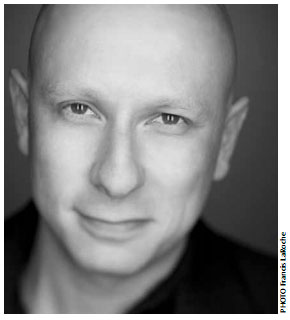An Actor in the Front Line: Paul Ahmarani by Marie Labrecque
/ October 10, 2012
Version française...
 He is surely one of the most interesting performers on the Quebec stage, known for both his demanding selections and his strong and unique presence—a uniqueness that Paul Ahmarani has learned to assume, and that has become an asset. But this originality can turn out to be a limitation. The actor says that he feels somewhat imprisoned by his image of an actor affiliated with intense and tortured roles. “People lack imagination. So they won’t think of me to play a character with more day-to-day problems.” He is surely one of the most interesting performers on the Quebec stage, known for both his demanding selections and his strong and unique presence—a uniqueness that Paul Ahmarani has learned to assume, and that has become an asset. But this originality can turn out to be a limitation. The actor says that he feels somewhat imprisoned by his image of an actor affiliated with intense and tortured roles. “People lack imagination. So they won’t think of me to play a character with more day-to-day problems.”
An animal in Coeur de chien or a nazi in La Noce, there is indeed little “conventionality” in the roles the actor plays in the theatre. “I’m often offered complex, double, or violently transformed characters. I take it as a compliment, in the sense that I am able to play difficult roles that require lots of implication and a certain skill. And to unearth troubling things within myself.”
After a hectic theatrical year, Paul Ahmarani will add two more disturbing roles this fall. In addition to reviving Étienne Lepage’s L’Enclos de l’éléphant, premiered at the latest Festival TransAmériques, he will premiere a text written by Larry Tremblay, Cantate de guerre, which explores “filiation” and the transmission of violence. The actor will incarnate a soldier completely perverted and driven crazy by the horrors of war that he himself perpetuates. He eventually finds himself faced with a boy who reminds him of his son. “It’s horrible: he wants to bequeath the desire to kill to his son.”
In short, the work exposes the destruction of human emotions caused by civil conflict, even more that conventional war. “Civil war sets communities, ethnicities, religions against one another. People who were neighbours the day before suddenly find themselves killing each other and raping women. Unfathomable things that completely dehumanize the soldier, who is no longer simply defending a territory; he is striving to see his opponent as not only the enemy, but truly as a human sub-race to exterminate. There is something awfully revolting in civil war. Man allows himself to go to the very ends of vengeance, of hate, of the vicious circle of death. It’s human nature at its worst, I think.”
To deal with this heavy subject, author Larry Tremblay uses an “extremely poetic” tone. A chorus of soldiers supports, completes or contradicts the protagonist’s words, enhancing the gravity of the text. “Very precise musical play is involved in the text. Martine Beaulne is putting a lot of importance on rhythm in putting the work together.”
Never a Shade Lighter
From Blasté to Exécuteur 14, Paul Ahmarani had often approached the atrocities of war from the inside. The necessity of living in these twilight zones day after day can become taxing, which the actor felt while playing Exécuteur 14 at the Usine C last year, especially since he was carrying the piece alone. “It wasn’t easy, playing such heavy roles, where I was suffering a lot on stage. With scenes where I was relating the rape of my girlfriend, the murder of a baby... When I exited the stage, I was destroyed. Peter Batakliev [the producer] was waiting for me backstage with a bottle of vodka. After the show, I was talking to my friends who had come to see me like the living dead. And it’s safe to say that during rehearsal, I couldn’t wait to get back home to hold my kids in my arms. I felt polluted with darkness. So, I had the impression that a similar shadow could haunt me after playing Cantate...”
However, as a younger actor, he was amazed when other actors appeared to be so completely immersed in a character that they couldn’t escape it. The forty-year-old’s vulnerability and empathy have sharpened over time. “As I grow older, my instrument is becoming more refined. Having kids also made me more sensitive—as if it were necessary!”
Why does he take on these roles, then? “Because they are challenges, super roles. Great texts.”
But the actor would also like to take part in lighter theatrical projects. “I’m very light-hearted in life,” he reassures us. “I’m not offered any parts. I think I’m seen as the sort of cliché of the intense, integral artist. People assume that I will scorn or look down on everything else, which is completely false.”
Both socially and politically engaged (he was an activist for Amnesty International and Québec Solidaire), he is also involved in his art. “All of these texts are humanist. I would never play in a work that conveyed values I oppose.”
Paul Ahmarani believes it is important to give way to reflexion on war, this “awful aspect of human nature” by means of a dramatic text. “Theatre has a poetically evocative capacity and a force of persuasion that it alone can bring, helped by the proximity of a human being that expresses emotions in real time.”
Version française... | 

